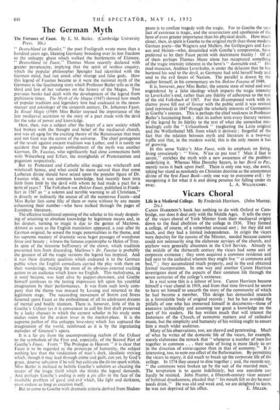Vicars Choral
Life in a Medieval College. By Frederick Harrison. (John Murray. 21s.) CANON HARRISON'S book has nothing to do with Oxford or Cam- bridge, nor does it deal only with the Middle Ages. It tells the story of the vicars choral of York Minster from their mediaeval origins down to the final abolition of the college in 1936. They formed a college, of course, of a somewhat unusual sort ; for they did not teach, and they had a limited independence. In origin the vicars were deputies for the canons of the Minster, needed because canons could not necessarily sing the elaborate services of the church, and anyhow were generally absentees in the Civil Service. Already in the middle of the thirteenth century the vicars had some sort of corporate existence ; they soon acquired a common residence and hall next to the cathedral wherein they might live "at commons and bed," ; they accumulated much property, and in the end obtained formal incorporation. In one way and another Canon Harrison investigates most of the aspects of their common life through the seven centuries of the college's existence.
In a real sense this is a labour of love. Canon Harrison became himself a vicar choral in 1919, and from that time forward he seems to have set himself to unearth the story of the community of which he had become a member. This design has demanded research in a formidable body of original records ; but he has avoided the pitfalls of one who has immersed himself in documents—those of excessive technicality and assuming too great a knowledge on the part of his readers. He has written much that will interest the historians of the Church, of economic matters and of cathedral music, but the simplicity and humanity of his writing ought to ensure him a much -wider audience.
Many of his observations, too, are shrewd and penetrating. Much of what he writes of the domestic life of the vicars, for example, merely elaborates the remark that "whenever a number of men live together in common . . . their scale of living is more likely to err in the direction of extravagance than in that of economy." It is interesting, too, to note one effect of the Reformation. By permitting the vicars to marry, it did much to break up the corporate life of the college. In 1574 they ceased to dine together ; and, the records say, "the commons were broken up by the suit of the married men." The temptation is to quote indefinitely, but one anecdote can hardly be resisted. John Hunter, a fifteenth-century vicar accused of habitual drunkenness, pleaded that." his mouth felt so dry he must needs drink." He was old and weak and, we are delighted to learn,


































 Previous page
Previous page